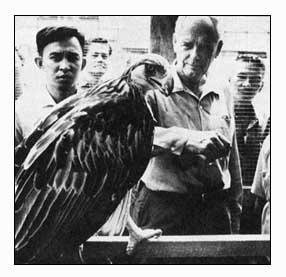 President Roosevelt
was really unhappy with Lindbergh. However, after a lot of begging, Roosevelt
allowed him to serve in WWII, in the Pacific, against the Japanese. He flew with
exceptional bravery, making many valuable contributions to the American war effort.
Following the Allied Victory, Lindbergh visited occupied Germany. He discovered
how he had been lied to,and used as a propaganda dupe by the German high command.
He saw the death camps, the slave labor incinerators, the technical specs and
launching platforms for intercontinental rockets targeting New York City. Temporarily
recanting his unpopular pre-war views, he went into seclusion, working for the
U.S. government on defense projects and the space program.
President Roosevelt
was really unhappy with Lindbergh. However, after a lot of begging, Roosevelt
allowed him to serve in WWII, in the Pacific, against the Japanese. He flew with
exceptional bravery, making many valuable contributions to the American war effort.
Following the Allied Victory, Lindbergh visited occupied Germany. He discovered
how he had been lied to,and used as a propaganda dupe by the German high command.
He saw the death camps, the slave labor incinerators, the technical specs and
launching platforms for intercontinental rockets targeting New York City. Temporarily
recanting his unpopular pre-war views, he went into seclusion, working for the
U.S. government on defense projects and the space program.
Even later, he became quite anti-technology. He enthusiastically participated in ecological and humanist causes: endangered tribal minorities, whales, eagles, rainforests. Lindbergh flew to the jungles of Africa, South America, Phillipines, etc. to work personally on these projects.
However, in his introductory chapter to the 1970-published "Wartime Journals," Lindbergh asserted that he still held the same pre-war beliefs, with no word of criticism for the Nazi government. He insisted that the war was wrong, and that the wrong government had been fought: Communist Russia was the real enemy. He even denied that the cause of the Allies had triumphed.
Lindbergh continued his work on humanist projects. He never learned to dance. The bold, gifted, outspoken pioneer died of cancer in Maui in 1974, facing crashing sea, vast sky, and brilliant sun.
LINDBERGH, Leonard Mosley (Doubleday, 1976)
CHARLES A. LINDBERGH: A BIO-BIBLIOGRAPHY, Perry Luckett (Greenwood Press,
1986)